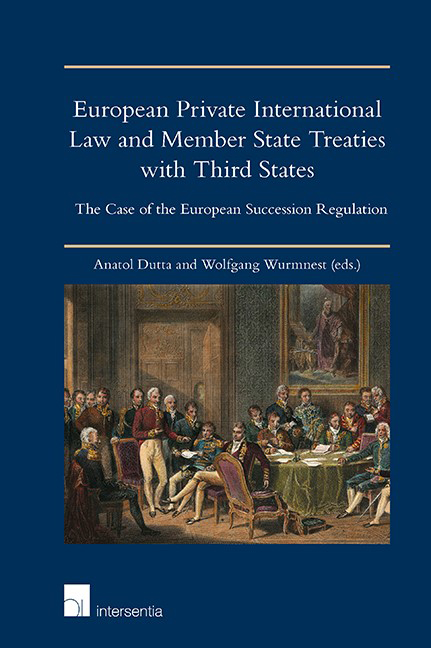 European Private International Law and Member State Treaties with Third States
European Private International Law and Member State Treaties with Third States Book contents
- Frontmatter
- Foreword
- Contents
- List of Treaties and Conventions
- List of Abbreviations
- List of Contributors
- Introduction
- Questionnaire
- PART I THE PERSPECTIVE OF EU MEMBER STATES
- PART II THE PERSPECTIVE OF THIRD STATES
- PART III THE PERSPECTIVE OF THE EUROPEAN UNION AND A COMPARATIVE OUTLOOK
- Annex
- Index
- About the Editors
Questionnaire
Published online by Cambridge University Press: 12 November 2019
- Frontmatter
- Foreword
- Contents
- List of Treaties and Conventions
- List of Abbreviations
- List of Contributors
- Introduction
- Questionnaire
- PART I THE PERSPECTIVE OF EU MEMBER STATES
- PART II THE PERSPECTIVE OF THIRD STATES
- PART III THE PERSPECTIVE OF THE EUROPEAN UNION AND A COMPARATIVE OUTLOOK
- Annex
- Index
- About the Editors
Summary
The contributors were equipped with the following questionnaire in order to structure their reports.
INTRODUCTION
Each report should address the following points. The questionnaire should, however, not be regarded as exhaustive. If in a certain jurisdiction or region other problems or challenges arise, those issues should be discussed as well. The draft structure outlined below might be a possible framework, but variations might be necessary for some jurisdictions.
TREATIES AND CONVENTIONS TAKING PRECEDENCE OVER THE EUROPEAN SUCCESSION REGULATION
– Has your jurisdiction ratified one or more bilateral treaty/ies or multilateral convention(s) (hereafter: ‘treaty’ or ‘treaties’) that take precedence over the rules of the European Succession Regulation (hereafter: ‘SR’) pursuant to Article 75 SR?
– If so, please provide a comprehensive list of those treaties, describe their (historical, social and/or economic) background and provide an official source (Official Journal or the like).
– Describe for each treaty its scope of application (ratione materiae, ratione personae). The following issues might in particular be of interest:
• Which issues of succession law are covered by the treaties (intestate succession, succession by testamentary disposition, forced heirship, testamentary executors, administration, special succession regimes for certain assets)? Are areas of law connected to succession covered, e.g. matrimonial property rights of the surviving spouse, family status, etc.?
• Does the treaty cover assets located solely in the Contracting States or also assets located in other States? Which rules govern the localization of assets, notably intangible assets? If property located in other States is not covered, which rules of private international law would a judge apply to those assets? This latter issue should be discussed in the section on private international law.
• If the treaty applies only to nationals of the Contracting States, please explain how multiple nationalities are dealt with (i.e. instances where a person holds a passport from each of the Contracting States or where a person holds a passport from a Contracting State and also from another State).
PRIVATE INTERNATIONAL LAW OF THE TREATY REGIMES
– Describe the private international law rules contained in those treaties in more detail. What are the relevant connecting factors? Does the treaty distinguish between movable and immovable assets? If so, which rules define the movable or immovable nature of an asset, e.g. as to shares in a company which owns immovables?
- Type
- Chapter
- Information
- European Private International Law and Member State Treaties with Third StatesThe Case of the European Succession Regulation, pp. 5 - 8Publisher: IntersentiaPrint publication year: 2019


